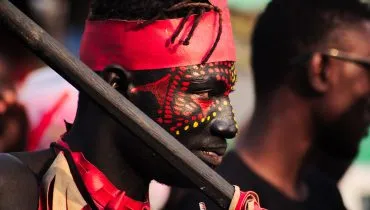Ghana is an ideal place to explore fresh fruit and vegetable markets, taste the delicious fried plantains seasoned with chili pepper and ginger, and stroll busy streets in a country where the sun almost always shines. Women wrapped in colorful West African fabrics and people playing draughts (a game similar to checkers) in courtyards or cafés provide just a slice of the diverse Ghanaian people. There are 52 ethnic groups in the ten regions of this country—making it easy to find a variety of traditional festivals and ceremonies to attend.
Whether at the stadium or in front of TV, you’ll enjoy spending time with your friends watching soccer, volleyball, track-and-field, boxing, or basketball. Ghanaian dancing music is known as highlife, influenced by jazz and other Western music, played on guitars and horns.


